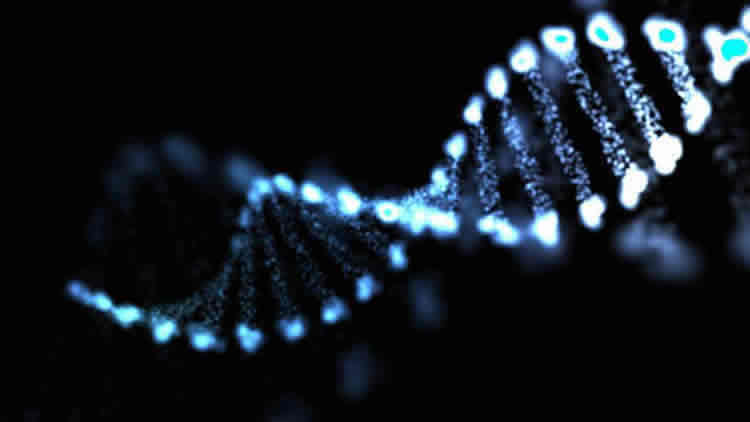Summary: Researchers reveal a repeat element in the DNA of C9orf72 gene becomes toxic when faced with starvation, toxins and viral infection.
Source: University of Michigan.
University of Michigan-led research brings scientists one step closer to understanding the development of neurodegenerative disorders such as ALS.
A study published today in Nature Communications details what the researchers describe as a vicious cycle of toxic protein production set in motion by cell stress. The paper explains how a repeat element in the DNA of C9orf72, a gene associated with amyotrophic lateral sclerosis and frontotemporal dementia, is translated into a toxic protein in the face of viral infection, starvation, toxins or problems with misfolded proteins.
It’s the latest study investigating repeat-associated non-AUG (RAN) translation in a host of neurological disorders that result from repeat mutations, including Huntington’s disease, ataxia and myotonic dystrophy.
“Stressed cells typically stop making proteins, but in this case the stress actually activates more toxic protein production, creating a loop that potentially drives neuronal death,” says first author Katelyn Green, a U-M graduate student in cell and molecular biology.

“This suggests that outside stressors might influence when people get neurodegenerative diseases, even when the patient has a genetic mutation,” adds senior author Peter Todd, M.D., U-M associate professor of neurology. “This may help explain when and why some people develop neurodegenerative diseases later in life.”
The research addresses the most common cause of ALS, or Lou Gehrig’s disease, leading to about 10 percent of cases. ALS is the most common motor neuron disease. The same repeat expansion mutation is also the most common genetic cause of frontotemporal dementia.
The researchers also found the same vicious cycle occurring at a second repeat mutation that causes a related neurodegenerative disease, fragile x-associated tremor/ataxia syndrome (FXTAS), suggesting this mechanism may be applicable to other repeat mutation disorders.
M. Rebecca Glineburg, Brittany N. Flores, Alexander E. Linsalata, Stephen J. Fedak and Sami J. Barmada, all of the University of Michigan; Michael G. Kearse of the University of Michigan and the University of Pennsylvania; Aaron C. Goldstrohm of the University of Minnesota.
Funding: The research was funded by VA Research Biomedical Laboratory Research and Development, National Institutes of Health, Packard Foundation, Michigan Alzheimer’s Disease Center and Protein Folding Disease Initiative, Ann Arbor Active Against ALS.
Source: Haley Otman – University of Michigan
Publisher: Organized by NeuroscienceNews.com.
Image Source: NeuroscienceNews.com image is in the public domain.
Original Research: Full open access research for “RAN translation at C9orf72-associated repeat expansions is selectively enhanced by the integrated stress response” by Katelyn M. Green, M. Rebecca Glineburg, Michael G. Kearse, Brittany N. Flores, Alexander E. Linsalata, Stephen J. Fedak, Aaron C. Goldstrohm, Sami J. Barmada & Peter K. Todd in Nature Communications. Published online December 8 2017 doi:10.1038/s41467-017-02200-0
[cbtabs][cbtab title=”MLA”]University of Michigan “Genetic Mutations Cause ‘Vicious Cycle’ in Most Common Form of ALS.” NeuroscienceNews. NeuroscienceNews, 8 December 2017.
<https://neurosciencenews.com/als-genetics-8132/>.[/cbtab][cbtab title=”APA”]University of Michigan (2017, December 8). Genetic Mutations Cause ‘Vicious Cycle’ in Most Common Form of ALS. NeuroscienceNews. Retrieved December 8, 2017 from https://neurosciencenews.com/als-genetics-8132/[/cbtab][cbtab title=”Chicago”]University of Michigan “Genetic Mutations Cause ‘Vicious Cycle’ in Most Common Form of ALS.” https://neurosciencenews.com/als-genetics-8132/ (accessed December 8, 2017).[/cbtab][/cbtabs]
Abstract
RAN translation at C9orf72-associated repeat expansions is selectively enhanced by the integrated stress response
Repeat-associated non-AUG (RAN) translation allows for unconventional initiation at disease-causing repeat expansions. As RAN translation contributes to pathogenesis in multiple neurodegenerative disorders, determining its mechanistic underpinnings may inform therapeutic development. Here we analyze RAN translation at G4C2 repeat expansions that cause C9orf72-associated amyotrophic lateral sclerosis and frontotemporal dementia (C9RAN) and at CGG repeats that cause fragile X-associated tremor/ataxia syndrome. We find that C9RAN translation initiates through a cap- and eIF4A-dependent mechanism that utilizes a CUG start codon. C9RAN and CGG RAN are both selectively enhanced by integrated stress response (ISR) activation. ISR-enhanced RAN translation requires an eIF2α phosphorylation-dependent alteration in start codon fidelity. In parallel, both CGG and G4C2 repeats trigger phosphorylated-eIF2α-dependent stress granule formation and global translational suppression. These findings support a model whereby repeat expansions elicit cellular stress conditions that favor RAN translation of toxic proteins, creating a potential feed-forward loop that contributes to neurodegeneration.
“RAN translation at C9orf72-associated repeat expansions is selectively enhanced by the integrated stress response” by Katelyn M. Green, M. Rebecca Glineburg, Michael G. Kearse, Brittany N. Flores, Alexander E. Linsalata, Stephen J. Fedak, Aaron C. Goldstrohm, Sami J. Barmada & Peter K. Todd in Nature Communications. Published online December 8 2017 doi:10.1038/s41467-017-02200-0






